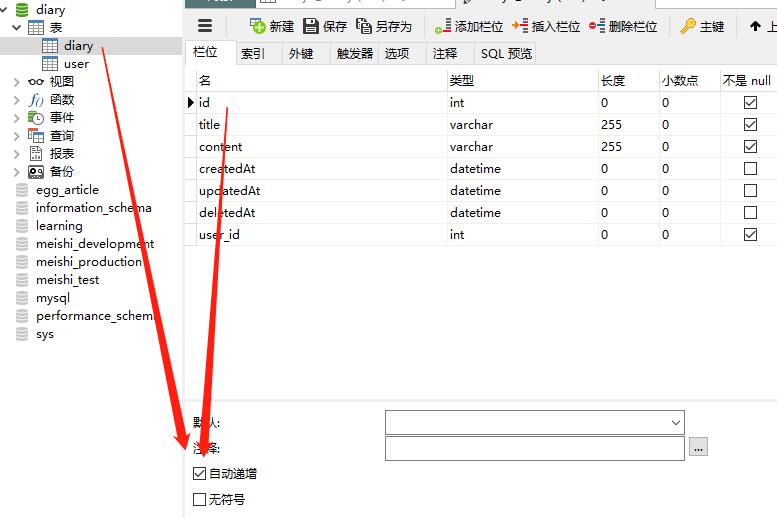使用EggJS开发接口使用数据库之egg-sequelize
Posted 每天都要进步一点点
tags:
篇首语:本文由小常识网(cha138.com)小编为大家整理,主要介绍了使用EggJS开发接口使用数据库之egg-sequelize相关的知识,希望对你有一定的参考价值。
Sequelize.JS是node里面比较常用的一个ORM(对象映射模型),提供了很多丰富的接口,egg-sequelize是基于其做的一个egg项目下的ORM插件
安装:
npm install egg-sequelize mysql2 -S // 或者 yarn add egg-sequelize mysql2
导入到egg项目中:
// 在config/plugin.js里面添加
exports.sequelize = {
enable: true,
package: \'egg-sequelize\'
}
// 或者,在config/plugin.js的module.exports里面添加
module.exports = {
sequelize: {
enable: true,
package: \'egg-sequelize\'
},
};
配置:
config.sequelize = {
dialect: \'mysql\', // 表示使用mysql
host: \'127.0.0.1\', // 连接的数据库主机地址
port: 3306, // mysql服务端口
database: \'diary\', // 数据库名
username: \'root\', // 数据库用户名
password: \'root\', // 数据库密码
define: { // model的全局配置
timestamps: true, // 添加create,update,delete时间戳
paranoid: true, // 添加软删除
freezeTableName: true, // 防止修改表名为复数
underscored: false // 防止驼峰式字段被默认转为下划线
},
timezone: \'+8:00\', // 由于orm用的UTC时间,这里必须加上东八区,否则取出来的时间相差8小时
dialectOptions: { // 让读取date类型数据时返回字符串而不是UTC时间
dateStrings: true,
typeCast(field, next) {
if(field.type === "DATETIME"){
return field.string();
}
return next();
}
}
};
注:在默认情况下,id字段会被设置为主键,并且是AUTO_INCREMENT的,不需要我们自己声明;
例如:
app/model/user.js
/**
* 用户模型
*/
module.exports = app => {
const { STRING, INTEGER } = app.Sequelize;
const User = app.model.define(\'user\', {
id: {
type: INTEGER,
autoIncrement: true,
primaryKey: true
},
name: {
type: STRING,
allowNull: false
},
password: {
type: STRING(32),
allowNull: false
}
});
// 表关联的字段
User.associate = function() {
// 一对多
app.model.User.hasMany(app.model.Diary, { foreignKey: \'user_id\', targetKey: \'id\'})
}
return User;
}
app/model/diary.js
/**
* 日志模型
*/
module.exports = app => {
const { STRING, INTEGER } = app.Sequelize;
const Diary = app.model.define(\'diary\', {
id: {
type: INTEGER,
autoIncrement: true,
primaryKey: true
},
title: {
type: STRING,
allowNull: false
},
content: {
type: STRING,
allowNull: false
}
});
// 表关联的字段
Diary.associate = function() {
app.model.Diary.belongsTo(app.model.User, { foreignKey: \'user_id\', targetKey: \'id\'})
}
return Diary;
}
在 controller 中调用 model:
app/controller/home.js
\'use strict\';
const Controller = require(\'egg\').Controller;
class HomeController extends Controller {
async index() {
const { ctx } = this;
ctx.body = \'hi, egg\';
}
// 添加日志
async add() {
const { ctx } = this;
// 从前端获取post请求发来的数据
const param = ctx.request.body;
const result = await ctx.model.Diary.create({
title: param.title,
content: param.content,
user_id: 2
});
console.log(\'add方法\', result);
if(result){
ctx.body = \'创建成功\';
}else{
ctx.body = \'创建失败\';
}
}
// 登录判断
async loginCheck() {
const { ctx } = this;
// // 关联查询
// const data = await ctx.model.User.findAll({
// include: {
// model: ctx.model.Diary
// }
// });
// ctx.body = data;
// post请求传来的参数
const { name, password } = ctx.request.body;
let message = \'\', data = {};
// 判断数据库里面是否存在该用户
const user = await ctx.model.User.findOne({
where: {
name: name
}
});
if(!user){
message = \'用户不存在\';
}else if(password !== user.password){
message = \'密码错误\';
}else{
message = \'登录成功\';
data = { id: user.id };
}
ctx.body = {
message,
data
};
}
}
module.exports = HomeController;
注:Field \'id\' doesn\'t have a default value 解决方案

原因 id 没有设置自动递增

以上是关于使用EggJS开发接口使用数据库之egg-sequelize的主要内容,如果未能解决你的问题,请参考以下文章